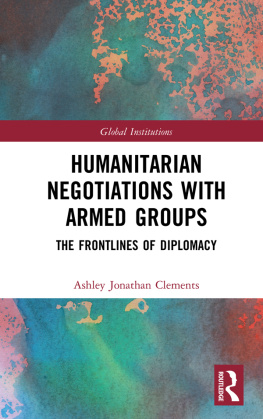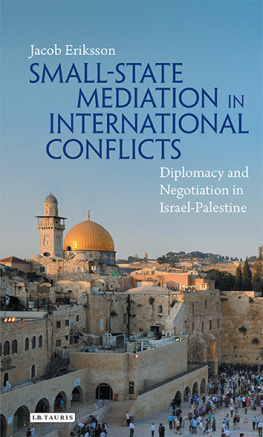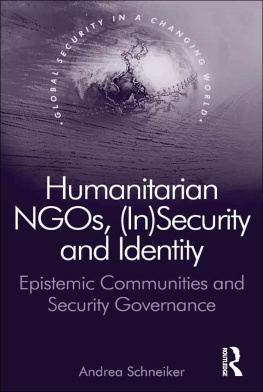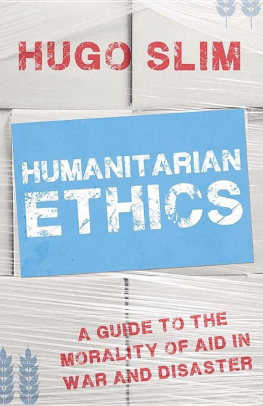Humanitarian Negotiations with Armed Groups
Humanitarians operate on the frontlines of todays armed conflicts, where they regularly negotiate to provide assistance and to protect vulnerable civilians. This book explores this unique and under-researched field of humanitarian negotiation. It details the challenges faced by humanitarians negotiating with armed groups in Yemen, Myanmar, and elsewhere, arguing that humanitarians typically negotiate from a position of weakness. It also explores some of the tactics and strategies they use to overcome this power asymmetry to reach more favorable agreements.
The author applies these findings to broader negotiation scholarship and investigates the implications of this research for the field and practice of humanitarianism. This book also demonstrates how non-state actors both humanitarians and armed groups have become increasingly potent diplomatic actors. It challenges traditional state-centric approaches to diplomacy and argues that non-state actors constitute an increasingly crucial vector through which international relations are replicated and reconstituted during contemporary armed conflict. Only by accepting these changes to the nature of diplomacy itself can the causes, symptoms, and solutions to armed conflict be better managed.
This book will be of interest to scholars concerned with conflict resolution, negotiation, and mediation, as well as to humanitarian practitioners themselves.
Ashley Jonathan Clements is a consultant and researcher from New Zealand. He has spent more than 15 years working in the humanitarian sector with the UN and NGOs, predominantly in the Middle East and Southeast Asia. Ashleys research focuses on negotiation, contemporary armed conflict, and non-state armed actors. He continues to research and advise on frontline humanitarian negotiations and conducts negotiation training for a range of audiences.
Routledge Global Institutions Series
Edited by Thomas G. Weiss
The CUNY Graduate Center, New York, USA and Rorden Wilkinson
University of Sussex, Brighton, UK
About the series
The Global Institutions Series provides cutting-edge books about many aspects of what we know as global governance. It emerges from our shared frustrations with the state of available knowledge electronic and print-wise for research and teaching. The series is designed as a resource for those interested in exploring issues of international organization and global governance. And since the first volumes appeared in 2005, we have taken significant strides toward filling many conceptual gaps.
The series consists of two related streams distinguished by their blue and red covers. The blue volumes, comprising the majority of the books in the series, provide user-friendly and short (usually no more than 50,000 words) but authoritative guides to major global and regional organizations, as well as key issues in the global governance of security, the environment, human rights, poverty, and humanitarian action among others. The books with red covers are designed to present original research and serve as extended and more specialized treatments of issues pertinent for advancing understanding about global governance.
The books in each of the streams are written by experts in the field, ranging from the most senior and respected authors to first-rate scholars at the beginning of their careers. In combination, the components of the series serve as key resources for faculty, students, and practitioners alike. The works in the blue stream have value as core and complementary readings in courses on, among other things, international organization, global governance, international law, international relations, and international political economy; the red volumes allow further reflection and investigation in these and related areas.
The books in the series also provide a segue to the foundation volume that offers the most comprehensive textbook treatment available dealing with all the major issues, approaches, institutions, and actors in contemporary global governance. The second edition of our edited work International Organization and Global Governance (2018) contains essays by many of the authors in the series.
Understanding global governance past, present, and future is far from a finished journey. The books in this series nonetheless represent significant steps toward a better way of conceiving contemporary problems and issues as well as, hopefully, doing something to improve world order. We value the feedback from our readers and their role in helping shape the on-going development of the series.
Multinational Rapid Response Mechanisms (2019)
John Karlsrud and Yf Rykers
Towards a Global Consensus Against Corruption (2019)
International Agreements as Products of Diffusion and Signals of Commitment
Mathis Lohaus
Negotiating Trade in Uncertain Worlds (2019)
Misperception and Contestation in EU-West Africa Relations
Clara Weinhardt
Negotiations in the World Trade Organization (2019)
Design and Performance
Michal Parizek
The International Organization for Migration (2020)
Challenges, Commitments, Complexities
Megan Bradley
Humanitarian Negotiations with Armed Groups (2020)
The Frontlines of Diplomacy
Ashley Jonathan Clements
Diaspora Organizations in International Affairs
Edited by Dennis Dijkzeul and Margit Fauser
Global Think Tanks
Policy Networks and Governance 2nd edition
James McGann with Laura Whelan
First published 2020
by Routledge
2 Park Square, Milton Park, Abingdon, Oxon OX14 4RN
and by Routledge
52 Vanderbilt Avenue, New York, NY 10017
Routledge is an imprint of the Taylor & Francis Group, an informa business
2020 Ashley Jonathan Clements
The right of Ashley Jonathan Clements to be identified as author of this work has been asserted by him in accordance with sections 77 and 78 of the Copyright, Designs and Patents Act 1988.
All rights reserved. No part of this book may be reprinted or reproduced or utilised in any form or by any electronic, mechanical, or other means, now known or hereafter invented, including photocopying and recording, or in any information storage or retrieval system, without permission in writing from the publishers.
Trademark notice: Product or corporate names may be trademarks or registered trademarks, and are used only for identification and explanation without intent to infringe.
British Library Cataloguing-in-Publication Data
A catalogue record for this book is available from the British Library
Library of Congress Cataloging-in-Publication Data
A catalog record for this book has been requested
ISBN: 978-0-367-35635-4 (hbk)
ISBN: 978-0-429-34080-2 (ebk)
Typeset in Times New Roman
by Apex CoVantage, LLC









